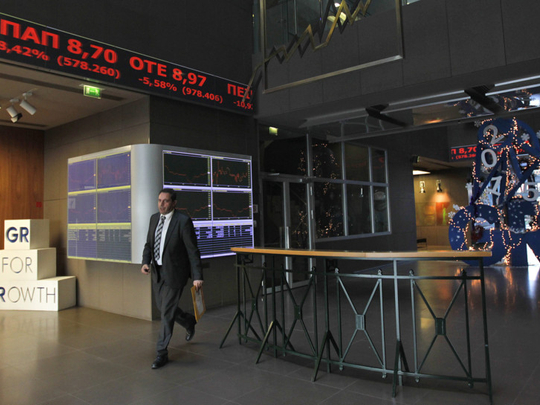
Like a bad penny, Greece keeps coming back to remind us of the folly of Europe’s grand experiment in monetary union and the havoc it has created for a once thriving continent. Make no mistake; Greece, and a number of other peripheral Eurozone nations too, do indeed need to leave the euro if ever they are to find a plausible path back to growth and debt sustainability. Devaluation via the reinstatement of the drachma would provide a natural, market-based mechanism for haircutting foreign creditors appropriately, as well as an immediate solution to the problem of lost competitiveness, now being so painfully addressed through economic shrinkage.
Yet, it is one thing to quit the euro in a controlled, negotiated and orderly manner — behind the protection of capital controls, with help from the International Monetary Fund (IMF) to get the country back on its feet — and quite another to be forced out amid political crisis, social upheaval and the idiocies of an extreme Left-wing policy agenda. It is this latter prospect that suddenly became very real on Monday, with the failure of the Greek parliament to agree on a new president. So desperate has their position become that Greeks may be about to vote for economic and political suicide rather than tolerate any more of the medicine prescribed to them by Berlin and Brussels. Failure to elect a president triggers an automatic election, which, on present polling, could result in a government led by the radical Left-wing Syriza party, which is intent on rejecting the austerity and structural reform of the European Union (EU) and the IMF, as well as seeking another write-down of Greece’s national debt.
Neither of these aims is particularly mad in itself — in some respects, they are just what the doctor should be ordering. But they are very likely incompatible with continued membership of the euro. Syriza has moderated its demands somewhat as it attempts to distance itself from the electorally damaging charge that a vote for it is a vote for “Grexit”, yet it does not much alter the underlying choice. Syriza wants to stay in the club, but it wants to rewrite the rules in a manner that allows it to throw off the shackles of austerity.
By threatening unilaterally to repudiate Greece’s debts, Syriza’s leader, Alexis Tsipras, is in essence engaging in a high-stakes game of poker: give us what we want, or we’ll trigger a new Eurozone crisis. Sadly, the most likely outcome of this strategy is utter ruin: For Greece, which would find its bluff very rapidly called, and perhaps for the rest of the Eurozone, which badly underestimates the contagion in the financial markets that would result from a chaotic Greek exit. Admittedly, Europe’s banking system is much stronger than it was during the meltdown of 2011-12.
The Eurozone has also buttressed itself with a number of backstops, including the promise of unlimited bond buying by the European Central Bank. It is sometimes argued that the rest of the single currency would actually be strengthened by a Greek exit, which might provide such a shocking example to others that they would finally get fully behind the programme. Yet, this is just wishful thinking.
Once the markets have dislodged one member, the principle will be established: They will soon be picking off others. And it won’t be hard to do so, given the political instability and loss of trust that the euro has managed to create throughout much of Europe. In any case, the immediate consequence of a non-negotiated Greek default would be the withdrawal by the European Central Bank of its support for the Greek banking system. To fill the gap, the central bank in Athens would have to provide its own liquidity, at which point Greece would effectively be out of the euro. What capital was left in the country would scramble to leave. Economic output would crater anew and inflation would sky-rocket. The deprivation Greeks have suffered thus far would look insignificant compared with what was to come.
For them, it would be horrendous enough. But to abandon one of its own so casually would scarcely be much better for the EU — predicated as it is on the manifest destiny of ever closer union. It would be the beginning of the end.
Greece has always been the Eurozone’s weakest link, but it is also no more than a proxy for the single currency’s wider vulnerabilities and contradictions. As with past flare-ups, abject disaster may yet be averted. Greeks may come to their senses and vote against Tsipras. If he wins power, he may blink. Or Berlin may. Only one thing is entirely certain: Rather than recovery or stability, 2015 will bring yet another chapter in the Eurozone’s apparently never-ending saga of turmoil and crisis.
— The Telegraph Group Limited, London, 2014








